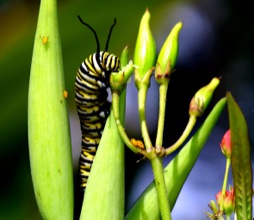Topic: Kabbalistic Concepts |
We learn in the portion of Korach that even those who attached themselves to Korach and did not have pure intentions were still able to infuse the tools they used in bringing what’s called the offering to the Creator with the Light of the Creator. Because, just as with Korach there was .01% of negative thought in action which ruined everything, so too was there .01% of positive thought in action, which revealed Light. So clearly, even actions as we do them currently, infused with our ego, reveal Light - maybe even great Light - but not ultimate Light. Not the ultimate blessings, not the ultimate removal of pain and suffering from this world. That cannot happen while our work is, as it is today, infused with our Desire to Receive for the Self Alone.
And what is one of the most powerful tools to get there? It says vayiplu al peneihem,that when the Israelites surround Moses and Aaron, “They fall on their faces, they fall to the ground.” All the Israelites, led by Korach and the 250 people who gathered with him, are surrounding Moses, arguing with him. Usually when people argue with us we shoot back an argument and our ego gets even greater. But Moses didn’t do that, because he knew the secret. He knew that actions are unimportant. It is the purity of heart. And so it says Moses and Aaron simultaneously fall to the ground. Why do they fall to the ground? It’s not that they became scared. It’s not that they were overtaken by emotion.
Rabbeinu Bachya, the great kabbalist, gives three reasons why they fell on their faces, and I want to talk about the third. He says they fell to show and awaken the complete removal of any emotional attachment to the situation. Moses knew that the only way he could reveal Light in this situation, certainly when his position is being attacked, is if he completely detached himself from everything that was going on. Because when a person falls on the ground and covers his eyes and mouth, he accepts that there is nothing that is going to happen that will be good for him or bad for him.
The physical action of Moses falling on his face was an awakening of a spiritual consciousness. Moses had to be in a place where he couldn’t care less if he continued being the leader, if Korach became the leader, or even, and this is an ultimate level, if the Israelites killed him right then. The only way that he could maintain a connection to the Light of the Creator was if in this moment he had zero attachment to what was going to happen next. That’s the first step. Not only is he detached, he also comes to the reality of understanding that he doesn’t even know what the right next step is. It’s not just enough to say I’m detached from what’s going to happen; he is also not going to allow his ego, his mind, to tell him what the right next thing is.
This is an important consciousness that is going to be very difficult for most of us to come to. Some of us, I think, can envision coming to a place where we say, “I am detached from this situation, I want the Light of the Creator to come in.” But we also, somewhere, know what the right thing to happen is; however, we have to have both. First we have to be detached from it completely, with no ego involvement at all. And second, we have to say I don’t know what the right thing to happen is. All of Moses’ thoughts, desires, and emotions were completely removed from the entire situation. His eyes and his mouth were closed, meaning he had neither a desire to say anything, nor did he know what he should say. He was completely removed from the situation, and wanted only what the Light of the Creator wanted.
Interestingly, the reason we have our feet together when we pray the Amidah is because when a person enters into the connection of the Amidah, he needs to come to this consciousness first of being completely removed from all that is occurring in his life, and secondly of saying, essentially, “I have no idea what the right next steps are - my legs are bound.” And from here can a person receive both the direction and the complete flow of the Light of the Creator into his life. That is why we have our feet together in the Amidah, and that is why sometimes when people pray, they put their hands together. Even though they might not know it, the original reason was to awaken this same consciousness, which is that my hands are tied; meaning, I don’t have any attachment to what happens next, and I have no knowledge of what should happen next. And only when the person has not just the physical actions of putting their hands together or putting their feet together, but actually awakens this consciousness, can the Light of the Creator truly come in.
Rabbeinu Bachya says that we are meant at least three times a day to awaken this consciousness, and so we pray the Amidah with our feet together three times a day. But when was the last time you took even 5 minutes, 10 minutes, or half an hour, to do this work - to look at your life and all the things that you are involved in physically and spiritually - and work towards detaching yourself from them completely? If we truly appreciate this teaching we receive on this Shabbat, then we understand that there is no hope for our actions to reveal the ultimate Light and blessings until we begin taking this work of detachment seriously. And if we are able to awaken this detachment - what’s called nefilat apaim - as Moses did, then the Light of the Creator comes completely into our life.
When we don’t have attachments to the things we are doing, then we don’t worry about them, and we don’t get upset about them. That’s ultimately the place we all want to get to in our spiritual work: “I’m doing this now because I believe this is what the Creator wants me to do right now. If tomorrow He tells me what I need to be doing is something completely different, then I’ll be as excited about that as I am about this.” And that’s the gift of the Shabbat of Korach, achieving what’s called nefilat apaim, achieving a complete detachment from everything that we do – and by doing that, allowing the Light of the Creator to flow into everything that we do and completely direct our lives.



